
Vaibhav Lab
Dr. Kumar Vaibhav is an Assistant Professor on tenure track in the Department of Neurosurgery at the Medical College of Georgia (MCG) at Augusta University, where he also holds an adjunct position in the Department of Oral Biology and Diagnostic Sciences.
He is also affiliated with Transdisciplinary Research Initiative in Inflammaging and Brain Aging (TRIBA) and The Graduate School at Augusta University. His academic journey has been marked by a strong foundation in toxicology, neuroanatomy, immunology and neuropharmacology, leading to a significant focus on neuroscience research, particularly in the areas of TBI, neurovascular injury, neuroimmunology, senescence, PTE, neurodegeneration and the effects of hypoxia and hypoglycemia on neuronal injury.
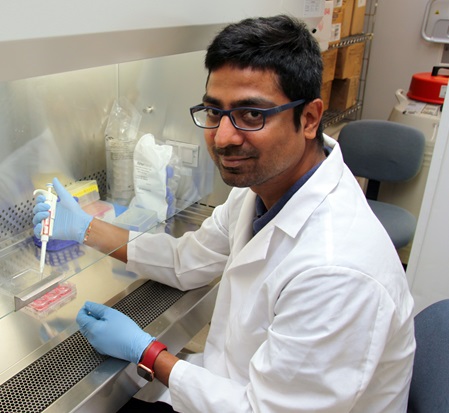
Jump to: Educational BackgroundProfessional Developments & TrainingService & Student SuccessResearch Focus & Contributions
Collaboration & Interdisciplinary Approach | Publications | Future DirectionsNews
Educational Background
Dr. Vaibhav's educational background is diverse and multidisciplinary. He completed his Bachelor of Science in Chemistry from Vinoba Bhave University in India, followed by a Master of Science in Toxicology from Jamia Hamdard (Hamdard University), New Delhi. His early career involved practical experience in the pharmaceutical industry, where he worked on analytical development and bioequivalence studies. He earned his Ph.D. in Toxicology with a specialization in Stroke and Neuropharmacology from Jamia Hamdard, which laid the groundwork for his future research endeavors.
Following his doctoral studies, Dr. Vaibhav pursued two post-doctoral fellowships. The first was at the Dr. B R Ambedkar Center for Biomedical Research at the University of Delhi, focusing on the interplay between hypoxia-hypoglycemia and neuronal injury. The second fellowship at Augusta University emphasized neurovascular injury and neuroimmunology, areas that would define his research focus.
Professional Developments
Kumar Vaibhav's professional development activities focus on enhancing his skills as a leader, reviewer, moderator, speaker, and mentor. His goals are driven by commitments to research, leadership, education, institution, and mentorship. He has participated in various programs to improve team building, diversity, and leadership skills, including “SoftskillsTM Percipio” and the “Research Leadership course” by Robel Consulting LLC.
Vaibhav has given numerous invited talks, chaired symposiums, and completed workshops on molecular docking and simulation. He has reviewed and edited many manuscripts and grants, serving as an Associate Editor for several journals such as Frontiers in Neuroscience, Biomedicines etc. He has also been actively involved in institutional committees and professional societies, contributing to the scientific community and mentoring students.
He has received awards such as the AURI Emerging Scientist Award 2020 and the Outstanding Young Basic Science Faculty Award 2022, reflecting his significant contributions to professional development.
Teaching
Vaibhav has been actively involved in teaching at Augusta University (AU) since 2017, focusing on both research mentorship and direct teaching. As an Assistant Professor, his efforts include mentoring undergraduate and graduate students, medical scholars, research staff, and postdoctoral fellows. He delivers didactic lectures in the DCG graduate curriculum.
Vaibhav has expanded his teaching and mentorship at Augusta University (AU), focusing on research mentorship and direct teaching. He mentors undergraduate and graduate students, medical scholars, research staff, and postdoctoral fellows, using innovative instructional approaches to maximize engagement and success. His efforts are reflected in positive feedback and evaluations.
Since joining AU as an Assistant Professor in 2020, he has mentored numerous students, contributing to publications, presentations, and career progression. Vaibhav has also served on PhD Thesis Committees and received the 2022 Outstanding Young Basic Science Faculty Award. His commitment to diversity, inclusion, and leadership enhances his teaching and mentorship.
Service
Kumar Vaibhav's service statement highlights his commitment to advancing Augusta University's (AU) mission through faculty participation and knowledge dissemination in Neuroscience. He actively contributes to various institutional, national, and international committees. He has served on AU committees, reviewed award applications, and participated in admissions interviews. He is a dedicated member of the National Neurotrauma Society and other professional societies, contributing to mentorship and knowledge dissemination. Vaibhav is also involved in community service, particularly in judging school science fairs. His efforts exemplify his dedication to AU's vision and global student success.
Student Success
Vaibhav lab has been dedicated to inclusion of students in research and scientific work and to developing a research aptitude to fulfill their career goals since 2014. Our students have contributed to 23 publications, 8 talks in conferences (5 international, 1 national and 2 regional), and 17 posters (7 international, 4 national and 6 regional) and 4 individual awards in conferences within the last five years. Students and staffs who completed training in the lab, have been successful in their careers and currently working in the reputed institutions and medical school.
Our constant effort to adapt to our mentorship and teaching according to the individual’s need and background helped us to achieve this success. In summary, Vaibhav’s mentorship at institutional and national level represents a noteworthy contribution to the AU vision of education and has been instrumental to our students’ success and growth. For the effort as research faculty, Dr. Vaibhav has been awarded 2022 outstanding Young Basic Science Faculty Award by MCG.
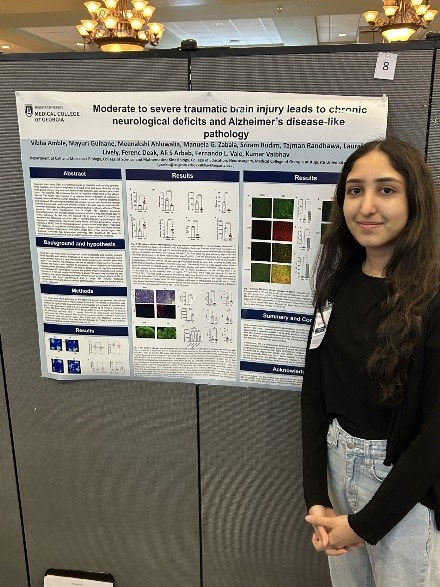
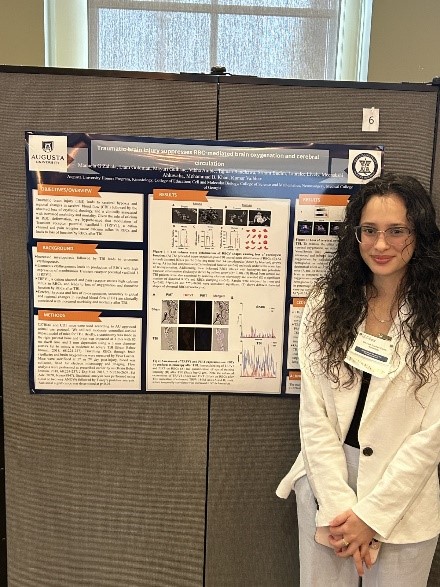
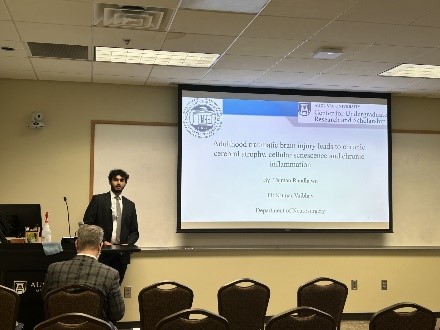
Research Focus & Contributions
Dr. Vaibhav is the director of Brain Injury, Senescence, and Translational Neuroscience Lab in the Department of Neurosurgery. As an Assistant Professor in the Department of Neurosurgery, Kumar Vaibhav has secured continuous extramural funding since 2017, focusing on high-impact research in Neuroscience, particularly in Traumatic Brain Injury (TBI). His lab's pioneering work on cannabinoid receptors in brain macrophages has established him as a leader in this field.
Since his promotion in 2020, he has significantly advanced understanding of immune responses post-trauma. Despite COVID-19 challenges, his achievements include securing multiple grants, publishing 72 peer-reviewed articles (Over 4500 citations with h index 34 in Nov. 2024), delivering numerous invited talks, and chairing symposiums. He actively mentors students, contributing to their success in research. Vaibhav is committed to professional development and has received notable awards for his contributions to science.
Dr. Vaibhav's research is primarily centered on understanding the mechanisms underlying neurovascular injuries and the immune response in the nervous system. His work is particularly relevant to conditions such as stroke, traumatic brain injury, and neurodegenerative diseases, where both neuronal damage and inflammatory responses play critical roles. . His work is characterized by a rigorous experimental approach, often involving in vitro and in vivo models to study neurovascular and neuroimmune interactions. His research findings have implications for developing new therapeutic strategies to treat various neurological disorders. By identifying the molecular targets involved in neurovascular injuries and the immune response, Dr. Vaibhav's work paves the way for potential interventions that could enhance recovery and improve patient outcomes.
Neurovascular Injury:
Dr. Vaibhav investigates the cellular and molecular mechanisms that contribute to neurovascular injury after TBI and hemorrhages. This includes studying the Neuroinflammation, blood-brain barrier's integrity and how it is compromised during pathological conditions. His research aims to identify potential therapeutic targets that could mitigate or prevent injury, thereby improving outcomes for patients suffering from cerebrovascular disorders.
TBI & Neurodegeneration:
One of the focus area of research in the lab is to explore chronic pathology post-TBI and TBI-associated neurodegeneration. The lab is actively exploring the cerebral atrophy, behavioral deficits and immunosenescence in chronic period.
Neuroimmunology:
Another significant aspect of Dr. Vaibhav's research is neuroimmunology, which examines the interactions between the nervous system and the immune system. He explores how immune responses can exacerbate or ameliorate neuronal injury. By understanding these interactions, Dr. Vaibhav aims to develop strategies that could harness the immune system to promote neuronal repair and recovery following injury.
Hypoxia & Hypoglycemia:
His earlier studies on hypoxia and hypoglycemia have provided insights into how these conditions lead to neuronal injury. Dr. Vaibhav's research has shown that the brain's response to low oxygen and glucose levels can trigger a cascade of neurodegenerative processes. By elucidating these pathways, he seeks to identify novel neuroprotective strategies that could be employed in clinical settings.
Stroke & Neuropharmacology:
Dr. Vaibhav's Ph.D. work focused on stroke and neuropharmacology, where he investigated the pharmacological agents that could potentially protect neurons from ischemic damage. His findings contribute to the broader understanding of how certain drugs can modulate neuroinflammation and promote neuronal survival during and after a stroke.
Collaboration & Interdisciplinary Approach
Dr. Vaibhav is known for his collaborative spirit, often working with colleagues from various disciplines, including neurology, immunology, biochemistry, vascular biology, neuroscience, radiology and pharmacology. This interdisciplinary approach enriches his research and fosters innovation, allowing for a more comprehensive understanding of complex neurological conditions.
Publications
| Publication |
|---|
Brain Injury and Neurodegeneration: Molecular, Functional, and Translational Approach 3.0Gaur, P., Ahluwalia, M., Ahluwalia, P. & Vaibhav, K., Dec 2025, In: Biomedicines. 13, 12, 3096.Research output: Contribution to journal › Editorial › peer-review |
Pesticide Exposure in Agricultural Workplaces and Resultant Health Effects in WomenKumar, S. N., Khan, N. H., Reda, Y., Beigh, H. H., Bastia, B., Vaibhav, K., Jain, A. K. & Raisuddin, S., Apr 2025, In: Birth Defects Research. 117, 4, e2460.Research output: Contribution to journal › Review article › peer-review |
Editorial: Neuro-immune interplay: unraveling the complexities of neurological complications and immunologyGaur, P., Vaibhav, K., Ahluwalia, M. & Gupta, S., 2025, In: Frontiers in Molecular Neuroscience. 18, 1607675.Research output: Contribution to journal › Editorial › peer-review |
Single episode of moderate to severe traumatic brain injury leads to chronic neurological deficits and Alzheimer’s-like pathological dementiaVaibhav, K., Gulhane, M., Ahluwalia, P., Kumar, M., Ahluwalia, M., Rafiq, A. M., Amble, V., Zabala, M. G., Miller, J. B., Goldman, L., Mondal, A. K., Deak, F., Kolhe, R., Arbab, A. S. & Vale, F. L., Dec 2024, In: GeroScience. 46, 6, p. 5439-5457 19 p.Research output: Contribution to journal › Article › peer-review |
Boosting Acetylcholine Signaling by Cannabidiol in a Murine Model of Alzheimer’s DiseaseKhodadadi, H., Salles, É. L., Naeini, S. E., Bhandari, B., Rogers, H. M., Gouron, J., Meeks, W., Terry, A. V., Pillai, A., Yu, J. C., Morgan, J. C., Vaibhav, K., Hess, D. C., Dhandapani, K. M., Wang, L. P. & Baban, B., Nov 2024, In: International journal of molecular sciences. 25, 21, 11764.Research output: Contribution to journal › Article › peer-review |
Brain Injury and Neurodegeneration: Molecular, Functional, and Translational Approach 2.0Ahluwalia, P., Gaur, P., Ahluwalia, M. & Vaibhav, K., Nov 2024, In: Biomedicines. 12, 11, 2586.Research output: Contribution to journal › Editorial › peer-review |
Altering biomolecular condensates as a potential mechanism that mediates cannabidiol effect on glioblastomaWang, L. P., Chagas, P. S., Salles, É. L., Naeini, S. E., Gouron, J., Rogers, H. M., Khodadadi, H., Bhandari, B., Alptekin, A., Qin, X., Vaibhav, K., Costigliola, V., Hess, D. C., Dhandapani, K. M., Arbab, A. S., Rutkowski, M., Yu, J. C. & Baban, B., Jun 2024, In: Medical Oncology. 41, 6, 140.Research output: Contribution to journal › Article › peer-review |
Incorporating Novel Technologies in Precision Oncology for Colorectal Cancer: Advancing Personalized MedicineAhluwalia, P., Ballur, K., Leeman, T., Vashisht, A., Singh, H., Omar, N., Mondal, A. K., Vaibhav, K., Baban, B. & Kolhe, R., Feb 2024, In: Cancers. 16, 3, 480.Research output: Contribution to journal › Review article › peer-review |
Design and Development of E-axle as a Retro and OE Fitment Solution for Light Commercial Vehicles Ranging from 1.5 to 5 Ton GVWVaibhav, K., Mulik, R. V. & Shrikrishna Ramdasi, S., Jan 16 2024, In: SAE Technical Papers.Research output: Contribution to journal › Conference article › peer-review |
A Machine Learning Approach for Moderating Toxic Hinglish Comments of YouTube VideosSingh, A., Vaibhav, K. & Arora, M., 2024, Data Science and Applications - Proceedings of ICDSA 2023. Nanda, S. J., Yadav, R. P., Gandomi, A. H. & Saraswat, M. (eds.). Springer Science and Business Media Deutschland GmbH, p. 173-187 15 p. (Lecture Notes in Networks and Systems; vol. 820).Research output: Chapter in Book/Report/Conference proceeding › Conference contribution |
Head Trauma: Etiology, Pathophysiology, Clinical Manifestation, and BiomarkersGoldman, L., Espinosa, M. P., Kumar, M., Debs, L. H., Vale, F. L. & Vaibhav, K., Jan 1 2024, Mechanism and Genetic Susceptibility of Neurological Disorders. Springer Science+Business Media, p. 35-57 23 p.Research output: Chapter in Book/Report/Conference proceeding › Chapter |
Inhalant Cannabidiol Inhibits Glioblastoma Progression Through Regulation of Tumor MicroenvironmentKhodadadi, H., Salles, É. L., Alptekin, A., Mehrabian, D., Rutkowski, M., Arbab, A. S., Yeudall, W. A., Yu, J. C., Morgan, J. C., Hess, D. C., Vaibhav, K., Dhandapani, K. M. & Baban, B., Oct 1 2023, In: Cannabis and Cannabinoid Research. 8, 5, p. 824-834 11 p.Research output: Contribution to journal › Article › peer-review |
Recombinant human DNase-I improves acute respiratory distress syndrome via neutrophil extracellular trap degradationJarrahi, A., Khodadadi, H., Moore, N. S., Lu, Y., Awad, M. E., Salles, E. L., Vaibhav, K., Baban, B. & Dhandapani, K. M., Sep 2023, In: Journal of Thrombosis and Haemostasis. 21, 9, p. 2473-2484 12 p.Research output: Contribution to journal › Article › peer-review |
Brain Injury and Neurodegeneration: Molecular, Functional, and Translational ApproachAhluwalia, M., Gaur, P. & Vaibhav, K., Jul 2023, In: Biomedicines. 11, 7, 1947.Research output: Contribution to journal › Editorial › peer-review |
Altered endocannabinoid metabolism compromises the brain-CSF barrier and exacerbates chronic deficits after traumatic brain injury in miceAhluwalia, M., Mcmichael, H., Kumar, M., Espinosa, M. P., Bosomtwi, A., Lu, Y., Khodadadi, H., Jarrahi, A., Khan, M. B., Hess, D. C., Rahimi, S. Y., Vender, J. R., Vale, F. L., Braun, M., Baban, B., Dhandapani, K. M. & Vaibhav, K., Mar 2023, In: Experimental Neurology. 361, 114320.Research output: Contribution to journal › Article › peer-review |
Understanding Acquired Brain Injury: A ReviewGoldman, L., Siddiqui, E. M., Khan, A., Jahan, S., Rehman, M. U., Mehan, S., Sharma, R., Budkin, S., Kumar, S. N., Sahu, A., Kumar, M. & Vaibhav, K., Sep 2022, In: Biomedicines. 10, 9, 2167.Research output: Contribution to journal › Review article › peer-review |
Pilot Study of Remote Ischemic Conditioning in Acute Spontaneous Intracerebral HemorrhageJarrahi, A., Shah, M., Ahluwalia, M., Khodadadi, H., Vaibhav, K., Bruno, A., Baban, B., Hess, D. C., Dhandapani, K. M. & Vender, J. R., May 12 2022, In: Frontiers in Neuroscience. 16, 791035.Research output: Contribution to journal › Article › peer-review |
Herbal drugs an alternative medicine for the treatment of neurodegenerative diseases: Preclinical and clinical trial reviewShrivastava, P., Revoori, A., Vaibhav, K., Ahluwalia, M. & Saxena, M., Jan 1 2022, Herbal Medicines: A Boon for Healthy Human Life. Elsevier, p. 3-17 15 p.Research output: Chapter in Book/Report/Conference proceeding › Chapter |
A potential role for cannabichromene in modulating TRP channels during acute respiratory distress syndromeKhodadadi, H., Salles, É. L., Shin, E., Jarrahi, A., Costigliola, V., Kumar, P., Yu, J. C., Morgan, J. C., Hess, D. C., Vaibhav, K., Dhandapani, K. M. & Baban, B., Dec 2021, In: Journal of Cannabis Research. 3, 1, 45.Research output: Contribution to journal › Article › peer-review |
Inflammaging and CannabinoidsBaban, B., Khodadadi, H., Salles, É. L., Costigliola, V., Morgan, J. C., Hess, D. C., Vaibhav, K., Dhandapani, K. M. & Yu, J. C., Dec 2021, In: Ageing Research Reviews. 72, p. 101487 101487.Research output: Contribution to journal › Article › peer-review |
Rescuing mitochondria in traumatic brain injury and intracerebral hemorrhages - A potential therapeutic approachAhluwalia, M., Kumar, M., Ahluwalia, P., Rahimi, S., Vender, J. R., Raju, R. P., Hess, D. C., Baban, B., Vale, F. L., Dhandapani, K. M. & Vaibhav, K., Nov 2021, In: Neurochemistry International. 150, 105192.Research output: Contribution to journal › Article › peer-review |
Conditioning medicine for ischemic and hemorrhagic strokeHess, D. C., Khan, M. B., Kamat, P., Vaibhav, K., Dhandapani, K. M., Baban, B., Waller, J. L., Hoda, M. N., Blauenfeldt, R. A. & Andersen, G., Jun 2021, In: Conditioning medicine. 4, 3, p. 124-129 6 p.Research output: Contribution to journal › Article › peer-review |
Pharmacological and therapeutic approaches in the treatment of epilepsyGhosh, S., Sinha, J. K., Khan, T., Devaraju, K. S., Singh, P., Vaibhav, K. & Gaur, P., May 2021, In: Biomedicines. 9, 5, 470.Research output: Contribution to journal › Review article › peer-review |
Infection and Immune Memory: Variables in Robust Protection by Vaccines Against SARS-CoV-2Ahluwalia, P., Vaibhav, K., Ahluwalia, M., Mondal, A. K., Sahajpal, N., Rojiani, A. M. & Kolhe, R., May 2021, In: Frontiers in immunology. 12, p. 660019 660019.Research output: Contribution to journal › Review article › peer-review |
Occupational exposure to pesticides in female tea garden workers and adverse birth outcomesKumar, S. N., Vaibhav, K., Bastia, B., Singh, V., Ahluwalia, M., Agrawal, U., Borgohain, D., Raisuddin, S. & Jain, A. K., Mar 2021, In: Journal of Biochemical and Molecular Toxicology. 35, 3, e22677.Research output: Contribution to journal › Article › peer-review |
AMPK induces regulatory innate lymphoid cells after traumatic brain injuryBaban, B., Braun, M., Khodadadi, H., Ward, A., Alverson, K., Malik, A., Nguyen, K., Nazarian, S., Hess, D. C., Forseen, S., Post, A. F., Vale, F. L., Vender, J. R., Nasrul Hoda, M., Akbari, O., Vaibhav, K. & Dhandapani, K. M., Jan 11 2021, In: JCI Insight. 6, 1, e126766.Research output: Contribution to journal › Article › peer-review |
Black seed (Nigella sativa): Pharmacological and therapeutic applications in endocrine dysfunctionFonseca, W. F., Ahluwalia, P., Bhatt, D. N., Ansari, S., Tabassum, R., Vaibhav, K. & Ahluwalia, M., Jan 1 2021, Black Seeds (Nigella sativa): Pharmacological and Therapeutic Applications. Elsevier, p. 405-422 18 p.Research output: Chapter in Book/Report/Conference proceeding › Chapter |
Cannabidiol ameliorates cognitive function via regulation of IL-33 and TREM2 upregulation in a murine model of Alzheimer's DiseaseKhodadadi, H., Salles, É. L., Jarrahi, A., Costigliola, V., Khan, M. B., Yu, J. C., Morgan, J. C., Hess, D. C., Vaibhav, K., Dhandapani, K. M. & Baban, B., 2021, In: Journal of Alzheimer's Disease. 80, 3, p. 973-977 5 p.Research output: Contribution to journal › Article › peer-review |
Nigella sativa and its active principles: Potential food for healthy livingBhatt, D. N., Ansari, S., Fonseca, W. F., Vaibhav, K. & Ahluwalia, M., Jan 1 2021, Black Seeds (Nigella sativa): Pharmacological and Therapeutic Applications. Elsevier, p. 197-216 20 p.Research output: Chapter in Book/Report/Conference proceeding › Chapter |
Bone Marrow Derived Extracellular Vesicles Activate Osteoclast Differentiation in Traumatic Brain Injury Induced Bone LossSingleton, Q., Vaibhav, K., Braun, M., Patel, C., Khayrullin, A., Mendhe, B., Lee, B. R., Kolhe, R., Kaiser, H., Awad, M. E., Fariyike, T., Elsayed, R., Elsalanty, M. E., Isales, C. M., Liu, Y., Hamrick, M. W., Dhandapani, K. M. & Fulzele, S., Jan 2021, In: Fuel Cells. 8, 1, 63.Research output: Contribution to journal › Article › peer-review |
Infections of the lung: a predictive, preventive and personalized perspective through the lens of evolution, the emergence of SARS-CoV-2 and its pathogenesisAhluwalia, P., Ahluwalia, M., Vaibhav, K., Mondal, A., Sahajpal, N., Islam, S., Fulzele, S., Kota, V., Dhandapani, K., Baban, B., Rojiani, A. M. & Kolhe, R., Dec 2020, In: EPMA Journal. 11, 4, p. 581-601 21 p.Research output: Contribution to journal › Review article › peer-review |
Revisiting traumatic brain injury: From molecular mechanisms to therapeutic interventionsJarrahi, A., Braun, M., Ahluwalia, M., Gupta, R. V., Wilson, M., Munie, S., Ahluwalia, P., Vender, J. R., Vale, F. L., Dhandapani, K. M. & Vaibhav, K., Oct 2020, In: Biomedicines. 8, 10, p. 1-42 42 p., 389.Research output: Contribution to journal › Review article › peer-review |
Neurological consequences of COVID-19: What have we learned and where do we go from here?Jarrahi, A., Ahluwalia, M., Khodadadi, H., Da Silva Lopes Salles, E., Kolhe, R., Hess, D. C., Vale, F., Kumar, M., Baban, B., Vaibhav, K. & Dhandapani, K. M., Sep 30 2020, In: Journal of Neuroinflammation. 17, 1, 286.Research output: Contribution to journal › Review article › peer-review |
Cannabidiol Modulates Cytokine Storm in Acute Respiratory Distress Syndrome Induced by Simulated Viral Infection Using Synthetic RNAKhodadadi, H., Salles, É. L., Jarrahi, A., Chibane, F., Costigliola, V., Yu, J. C., Vaibhav, K., Hess, D. C., Dhandapani, K. M. & Baban, B., Sep 1 2020, In: Cannabis and Cannabinoid Research. 5, 3, p. 197-201 5 p.Research output: Contribution to journal › Article › peer-review |
Targeting the endocannabinoid system: a predictive, preventive, and personalized medicine-directed approach to the management of brain pathologiesReddy, V., Grogan, D., Ahluwalia, M., Salles, É. L., Ahluwalia, P., Khodadadi, H., Alverson, K., Nguyen, A., Raju, S. P., Gaur, P., Braun, M., Vale, F. L., Costigliola, V., Dhandapani, K., Baban, B. & Vaibhav, K., Jun 1 2020, In: EPMA Journal. 11, 2, p. 217-250 34 p.Research output: Contribution to journal › Review article › peer-review |
Neutrophil extracellular traps exacerbate neurological deficits after traumatic brain injuryVaibhav, K., Braun, M., Alverson, K., Khodadadi, H., Kutiyanawalla, A., Ward, A., Banerjee, C., Sparks, T., Malik, A., Rashid, M. H., Rashid, M. H., Khan, M. B., Waters, M. F., Hess, D. C., Arbab, A. S., Vender, J. R., Hoda, N., Hoda, N., Hoda, N. & Baban, B. & 1 others, Dhandapani, K. M., May 2020, In: Science Advances. 6, 22, p. eaax8847 EAAX8847.Research output: Contribution to journal › Article › peer-review |
Regulation of Innate Lymphoid Cells in Acute Kidney Injury: Crosstalk between Cannabidiol and GILZBaban, B., Khodadadi, H., Vaibhav, K., Marchetti, C., Riccardi, C. & Mozaffari, M. S., 2020, In: Journal of Immunology Research. 2020, p. 6056373 6056373.Research output: Contribution to journal › Article › peer-review |
Honey: A Sweet Way to HealthAhluwalia, M., Ahluwalia, P., Dhandapani, K. M. & Vaibhav, K., Jan 1 2020, Therapeutic Applications of Honey and its Phytochemicals: Vol.1. Springer Singapore, Vol. 1. p. 53-80 28 p.Research output: Chapter in Book/Report/Conference proceeding › Chapter |
Impact of cannabidiol treatment on regulatory T-17 cells and neutrophil polarization in acute kidney injuryBaban, B., Hoda, N., Malik, A., Khodadadi, H., Simmerman, E., Vaibhav, K. & Mozaffari, M. S., Oct 5 2018, In: American Journal of Physiology - Renal Physiology. 315, 4, p. F1149-F1158Research output: Contribution to journal › Article › peer-review |
Remote ischemic post-conditioning promotes hematoma resolution via AMPK-dependent immune regulationVaibhav, K., Braun, M., Khan, M. B., Fatima, S., Saad, N., Shankar, A., Khan, Z. T., Harris, R. B. S., Yang, Q., Huo, Y., Arbab, A. S., Giri, S., Alleyne, C. H., Vender, J. R., Hess, D. C., Baban, B., Hoda, M. N. & Dhandapani, K. M., Oct 1 2018, In: Journal of Experimental Medicine. 215, 10, p. 2636-2654 19 p.Research output: Contribution to journal › Article › peer-review |
Future Directions
Looking forward, Dr. Vaibhav aims to expand his research into the role of other organs in neuroinflammatory processes and neurovascular health. His lab has expanded the work in TBI-induced senescence and neurodegeneration. He is also interested in exploring the potential of regenerative medicine and stem cell therapies in promoting recovery from neurovascular injuries.
In addition to his research, Dr. Vaibhav is dedicated to teaching and mentoring students and trainees in the field of neuroscience. He believes in fostering the next generation of scientists and clinicians who will continue to advance our understanding of the nervous system and its disorders.
Dr. Kumar Vaibhav's research at Augusta University represents a significant contribution to the field of neuroscience. His work not only enhances our understanding of the underlying mechanisms of neurological disorders but also holds promise for developing new therapeutic strategies that could ultimately improve patient care. As he continues to explore these critical areas of research, Dr. Vaibhav remains committed to advancing the field of neuroscience and training future scientists.
Lab Staffs

Mayuri Gulhane
Mayuri Gulhane is a Research Associate in the Department of Neurosurgery, currently focused on “Traumatic Brain Injury (TBI)”, TBI-induced retinopathy, Histology, Flow Cytometry, PCRs, Cell culture and other laboratorial work. With a strong academic background in Veterinary Science (BVSc) and a Master's degree (MVSC) in Animal Biotechnology, she brings a unique interdisciplinary approach to her research. Her work aims to deepen the understanding of neuropathological conditions resulting from brain injuries, contributing to innovative treatments and enhanced recovery.
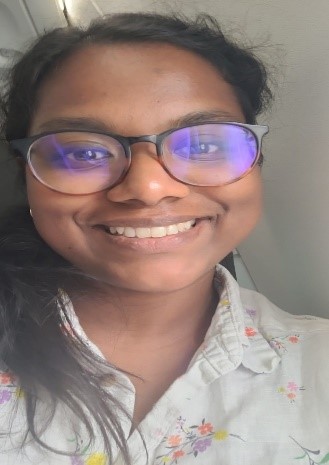
Tabitha Royal
Tabitha Royal is a research associate in Vaibhav's Lab at MCG-Neurosurgery, Augusta University, where she has been a member of the lab staff since April 2024. She earned her Bachelor's degree in Pharmacy (B. Pharm) from the Birla Institute of Technology and Science, Pilani, in 2021, followed by a Master's degree in Neuroscience (MSc.) from Tel Aviv University in 2023. Tabitha specializes in molecular biology techniques and histology, assists with the maintenance of the mouse colony, and is skilled in mouse handling and the induction of Traumatic Brain Injury through controlled cortical impact, contributing to the lab’s research efforts.
Medical Students
Mario Espinosa
Liam Goldman
Undergraduate Students
Manuela Guzman Zabala
She is a Junior year student and a first graduate in the family, exploring circulatory defects post-TBI
Tajman Randhawa
He is also a Junior student and exploring the sexual dimorphism in brain injury.
Sriram Budim
He is a sophomore student and working on neurodegeneration.
Vibha Amble
She is a junior student and worked on cerebral atrophy post-TBI.
Shreya Sunil
She is a sophomore student and working on neuroinflammation.
News
- Kumar Vaibhav’s profile
https://www.augusta.edu/faculty/directory/view.php?id=KVAIBHAV
Eurekalert!AAAS: https://www.eurekalert.org/multimedia/688393
- CBD and Alzheimer’s disease
Jagwire (March 8, 2021) https://jagwire.augusta.edu/cbd-reduces-plaque-improves-cognition-in-model-of-familial-alzheimers/
Mentioned my name as a co-author of study.
- Cannabinoids may help limit secondary damage of TBIs.
The Nation (May 19, 2021): https://nation.com.pk/19-May-2021/cannabinoids-may-help-limit-damage-to-brain-injuries
JagWire (Nov 17, 2020): https://jagwire.augusta.edu/cannabinoids-may-help-limit-secondary-damage-of-tbis/
Eurelkalert!AAAS (Nov 17, 2020): https://www.eurekalert.org/news-releases/753893
NRTimes (Nov 19, 2020): https://www.nrtimes.co.uk/cannabinoids-may-help-limit-secondary-damage-of-tbis/
Cannabishealth (Nov 19, 2020):
https://cannabishealthnews.co.uk/2020/11/19/cannabinoids-may-help-limit-secondary-damage-of-tbis/
- Emerging scientist Award: Emerging Science Award - 2020
European Higher Education Organization (Jan 14, 2021): https://eurohighereducation.com/2021/01/14/faculty-recognized-with-augusta-university-research-institute-awards/
- TRPV1 in TBI (Receptor that feels the heat of a red chili pepper may be target for TBI recovery):
MedicalXpress (Apr 13, 2018): https://medicalxpress.com/news/2018-04-receptor-red-chili-pepper-tbi.html
JagWire (Apr 13, 2018): http://jagwire.augusta.edu/archives/52693
Medical news (Apr 13, 2018): https://www.news-medical.net/news/20180413/Receptor-that-detects-heat-of-red-chili-pepper-may-help-protect-the-brain-after-TBI.aspx
- CBD may help avert lung destruction in COVID-19
WHO (COVID-19, Global literature on coronavirus disease, Article | WHO COVID | ID: covidwho-638503) https://pesquisa.bvsalud.org/global-literature-on-novel-coronavirus-2019-ncov/resource/en/covidwho-638503
Jagwire (July 16, 2020) https://jagwire.augusta.edu/cbd-may-help-avert-lung-destruction-in-covid-19/ (Mentioned my name as a co-author of study)
Research Article published (July 8, 2020) https://www.liebertpub.com/doi/abs/10.1089/can.2020.0043
- Dean’s Diary-Dr. Kumar Vaibhav and his R01 grant (Aug 21, 2020) https://deansdiary.augusta.edu/archives/2194
- Stem cells therapy in stroke:
Science daily/UGA (Feb 15, 2018): https://www.sciencedaily.com/releases/2018/02/180215105742.htm
Mentioned my name as a co-author of study in reference section.
- Cannabinoids & brain:
Meta fact (May 28, 2018): https://metafact.io/users/kumar-vaibhav